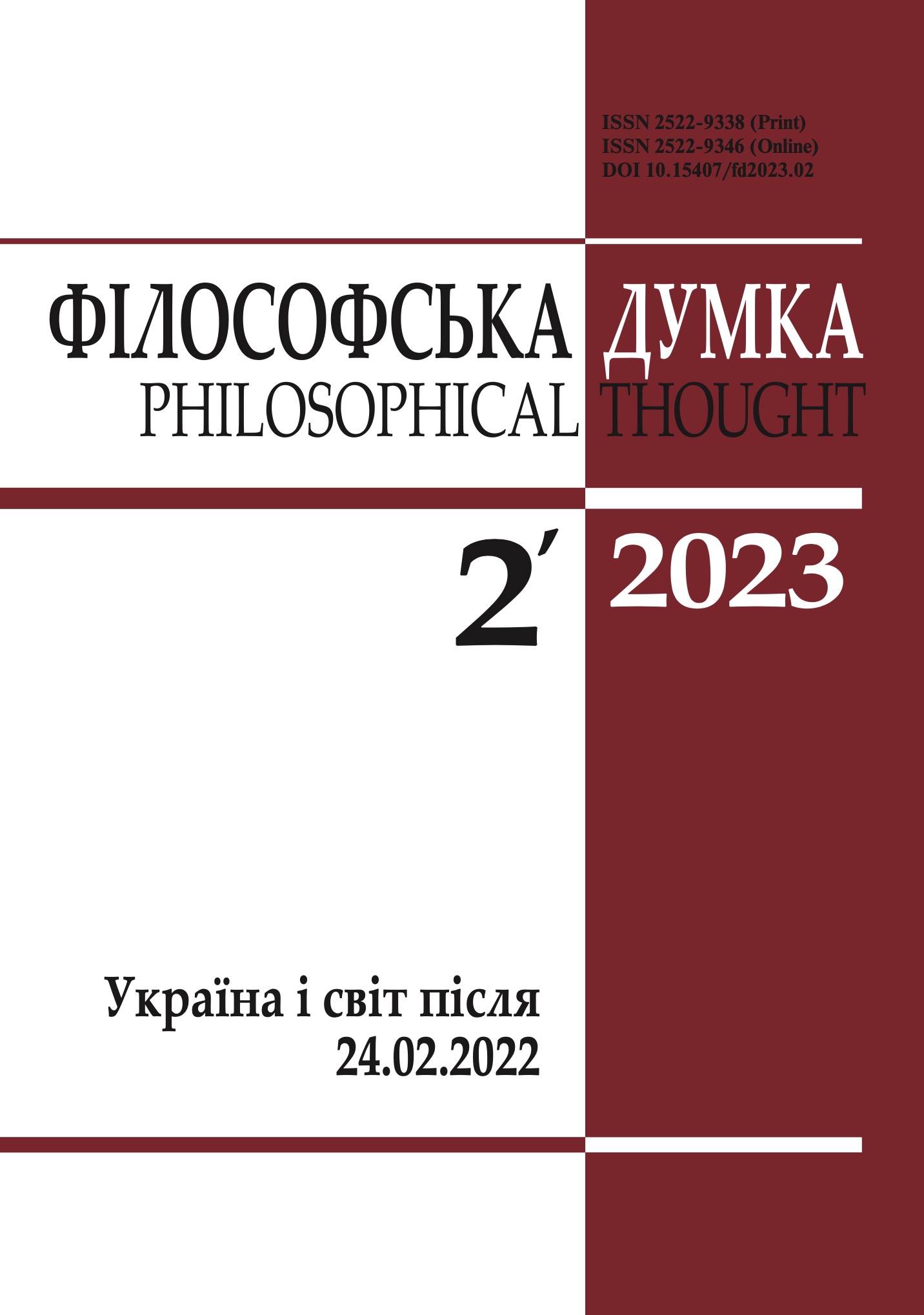SKOVORODA’S PHILOSOPHY AND CALLING OF CONTEMPORARY PEOPLE
CONTINUATION OF THE TOPIC The philosophy of Hryhorii Skovoroda: History and modernity
DOI:
https://doi.org/10.15407/fd2023.02.132Keywords:
calling, happiness, spiritual freedom, good, moral duty, self-realization of the individual, anthropological crisisAbstract
The article is devoted to the analysis of understanding of calling in the works of Skovoroda and its significance for the world-views and life choices of contemporary people. The current crisis phenomena are explicated in the light of the points of Skovoroda’s philosophy on the disparity between material and spiritual dimensions of human existence, irrelevance of work, devaluation of self-knowledge, individualism, and consumerism. The result is spiritual slavery and inability of people to respond to the challenges of contemporaneity. According to Skovoroda’s principle of self-knowledge, a person has to hear the internal call of existential truth or “God’s Spirit” which motivates for work, public service, and moral improvement. The author explicates 3 semantic levels in Skovoroda’s philosophy of calling: individual, social, and spiritual. By Skovoroda, calling appears as a natural desire to act in a certain sphere, but its end is in the Kingdom of God.
The author presents the results of the research of the experience of calling of contemporary Ukrainians and explicates the typology of that experience. The article states that the revealed structure of calling “desire-abilities-realization-good” corresponds in general with the understanding of calling by Skovoroda. Therefore, this structure is constant over time. Nevertheless and contrary to the ethics of Skovoroda, nowadays, the motivation of self-development prevails over the value of care for common good and spiritual goals in understanding of calling. The comparison of the experience of calling in the minds of student youth in Ukraine and in the USA confirms its identity on the basis of common Judaic-Christian tradition. The differences in the contemporary understanding of calling are determined along the lines of religiosity versus secularity, and Protestantism versus Eastern Christianity. In particular, noted moral rigorism of the protestant understanding of calling as an obligation, whereas Jews and the other Christians conceive calling in the forms of light, easiness, and happiness. The author reasoned the significant motivating and pedagogical capability of the idea of calling in the contemporary world. The article emphasizes the importance of Skovoroda’s critical philosophic attitude towards individualism and consumerism in the direction of overcoming problems of environment, particularly of climate change induced by unstoppable growth of energy consumption, and of anthropological crisis.
References
Bigham, J. T. (2008). Role of Spirituality in Persons Choosing a Career in Education: Calling as a Motivating Factor. A Dissertation. Lynchburg, VA: Liberty University.
Briggle, A. (2021). Thinking through Climate Change. A Philosophy of Energy in the Anthropocene. Cham: Palgrave Macmillan. https://doi.org/10.1007/978-3-030-53587-2
https://doi.org/10.1007/978-3-030-53587-2
Descartes, R. (2000). Méditations Métaphysiques. Transl. from French by Z. Borysiuk and O. Zhupanskiy. [In Ukrainian]. Kyiv: Universe.
Мalakhov, V. А. (1999). "My Burden is Light". After the Pages of the Gospels. [In Ukrainian]. Dukh i litera, 5-6, 311-320.
Muliarchuk, Y. І. (2019). The Philosophy and Pedagogic of Calling. [In Ukrainian]. Kyiv: Dukh i litera.
Popovych, М. (2007). Hryhorii Skovoroda: the Philosophy of Freedom. [In Ukrainian]. Kyiv: Biletski's Studio.
Rahner, K., & Vorgrimler, H. (1965). Theological Dictionary. New York: Herder and Herder.
Shynkaruk, V. І. (Ed.). (1972). Philosophy of Hryhorii Skovoroda. [In Ukrainian]. Kyiv: Naukova dumka.
Skovoroda, H. (1973). Complete Collection of Works in 2 Volumes. V. 1. [In Old Ukrainian]. Kyiv: Naukova dumka.
Skovoroda, H. (1994a). Works in 2 Volumes. Volume 1: Poetry.Fables. Tractata. Dialogues. [In Ukrainian]. Kyiv: "Oberehy" JS. (Harvard Library of Early Ukrainian Literature).
Skovoroda, H. (1994b). Works in 2 Volumes. Volume 2: Tractata. Dialogues. Parables. Translations. Letters. [In Ukrainian]. Kyiv: "Oberehy" JS. (Harvard Library of Early Ukrainian Literature). VanOosting, J. (2005). And the Flesh Became Word: Reflections Theological and Aesthetic. NewYork: A Crossroad Book.
Weber, М. (1994). The Protestant Ethics and the Spirit of Capitalism. Transl. from German by О. Pohorilyi. [In Ukrainian]. Кyiv: Оsnovy.
Downloads
-
PDF (Українська)
Downloads: 215
Published
How to Cite
Issue
Section
License
Authors who publish with this journal agree to the following terms:
- Authors retain copyright and grant the journal right of first publication.
- Authors are able to enter into separate, additional contractual arrangements for the non-exclusive distribution of the journal's published version of the work (e.g., post it to an institutional repository or publish it in a book), with an acknowledgement of its initial publication in this journal.
- Authors are permitted and encouraged to post their work online (e.g., in institutional repositories or on their website) prior to and during the submission process, as it can lead to productive exchanges, as well as earlier and greater citation of published work (See The Effect of Open Access).


